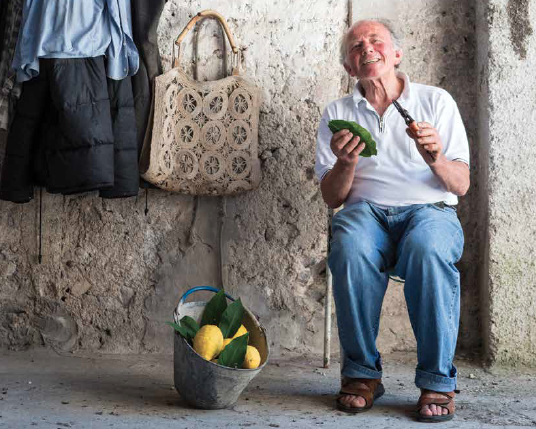Walking up to il Valle dei Mulini above Amalfi, one leaves the main piazza, her shops, the Duomo and her gelato behind. We find the entrance to the “valley of the mills” lemon grove to start our climb up. Luigi Aceto was waiting for us. A spry man in his 70’s with pinch-worthy red cheeks pokes his head out from behind a crate of lemons. Buongiorno!
The lemons from Amalfi are longer than normal – sfusato they call them here. He explains a bit to us about his lemons, their history and what makes Amalfi lemons so special. For one, they are grown on historic terraced grounds. He pointed out the terraced hills and said, “Do you see these dry rock walls? There’s no cement here . . . just hand carved rocks. This way the sun is not only infused from above, but from below, right at the root. We walked under the pergolas all together – up, up and up. Amalfi is a seaside town built vertically into the hillside. The surrounding rock mountains were intimately close and terraced as well. It offered a stunning view. Even though we couldn’t see it from there, we knew the sea was below. We had arrived by boat. Amalfi was one of the first maritime republics in Italy, along with Pisa, Venice, and Genoa. They traded lemons and pasta for spices and iron. Amalfi was the first province to export lemons abroad. Now they are a protected Presidio of Slow Food and you will find the taste of their lemons in the gelato of GROM in New York.
At 73, Luigi popped up the mountain like it was nothing. We all followed in his footsteps. You could tell straight away that he was a man of the earth. He told stories of the old days and how they transported the 70-kilo baskets of lemons on the back of their necks and shoulders. Old pictures showed barefoot women in dresses loading wooden crates just as heavy into old wooden boats for transport.
Luigi talked of his relationship with his lemons: “I talk to them; they are a part of my blood.” When I asked him if the lemons talked back, he looked at me for a minute and said, “Mi fanno soffrire ma no mi tradiscono- they make me suffer but they never betray me.” He said. He showed me where he kept the sheep manure he put on the soil to feed it. After another minute, he looked at me with that elfin face and said, “You know, more than likely I was conceived under a lemon tree. I came from a family of 13. We all lived in one room. Surely my parents didn’t want to make love in front of the children, so they went here and there where it was romantic. Back in the 30s, for farmers there was nothing inappropriate about it. Surely I must have been conceived that way, as I feel it in my bones. More than likely I have ‘succo di limone’ (lemon juice) running through my veins rather than blood.”

Note: this post was originally written in 2007. Luigi is now 80 and continues to care for his lemons and our guests when we visit during our Culinary Adventure in Amalfi.
